#and family always has conflicts of morals and interests
Explore tagged Tumblr posts
Text
so, i am one film in of my the hobbit re-watch and it's interesting how they portrayed each dwarf visually. there's quite an amount of fighting which showcases us the way they act: who's the fighter and who's the carer, who's the leader and who's the follower, who's the mind and who's the brutal force. but — their appearance does tell a huge part of the untold story about who they are and what are their roles in the company.
while re-watching 'an unexpected journey' i had an opportunity to pay closer attention to fili and kili:
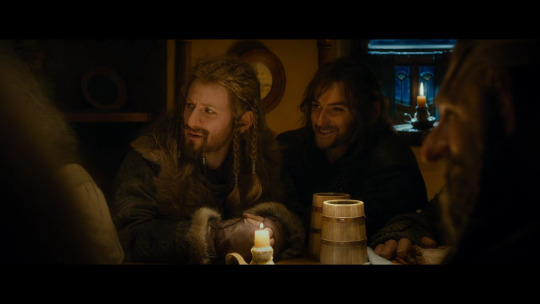
and if i still didn't know a single thing about them aside basics and was asked «who's going to be the next king?», i'd say fili without hesitation, based only on the visual.
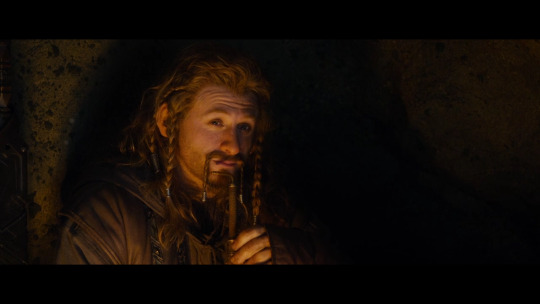
fili is put together. he might even seem to be somewhat arrogant with his facial expressions. and visual implications of him being the mature one are in his braids, his still growing beard but already braided mustache.
in comparison to kili — fili has a little bit of the weight that the age brings on him.
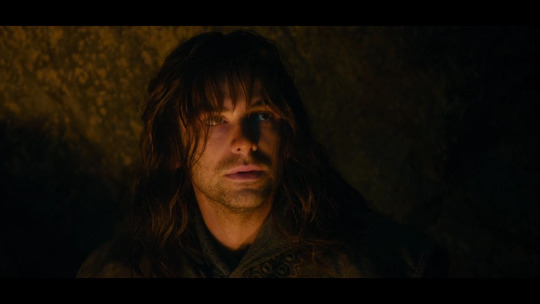
one of the reasons why we might sympathise alot with kili is because kili feels young. his appearance screams that he is the youngest: long unbraided/barely braided hair and those bangs, strands of hair over his face in a way to make it look rounder and cuter. we see kili act impulsively, him being all over the place with attachement and trust, him being childishly loud and stupidly brave. and his appearance really makes sense of that.
the relationships between durin's are also quite interesting to look at:
the thing with fili is not just him being the oldest of the brothers, for also because he is prepared/taught to be mature one. we hear it quickly in action during the departure from laketown but richard also said in the appendices that thorin prepares fili to be the next to the throne. and i think, he used the word «groomed» which might mean that they're at the beginning of the process that is not exactly wanted by one of the sides. hence, why i am using «prepared/taught to» — fili is still young and dumb at times but he is ahead of kili on the ride of growing up. because he has to. he is, again, more put together but he has alot of weaponry that he carries on him in order to be prepared for any sort of fight. he learns skills and hence the reason he still has huge assignment of blades to chose from.
fili is also less confrontational with thorin. kill is really open and honest about his feelings towards thorin's actions, for example in the scenes where thorin is unfair to bilbo. seems like kili really did get attached to the hobbit and was not shy to be judgemental.
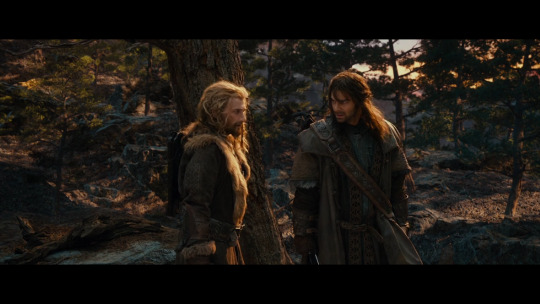
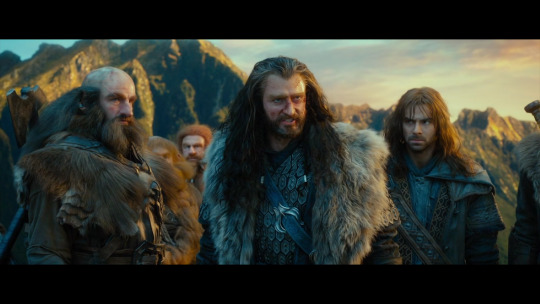
also desperate for he is still young and doesn't really understand the meaning of calculated decisions and compromises.
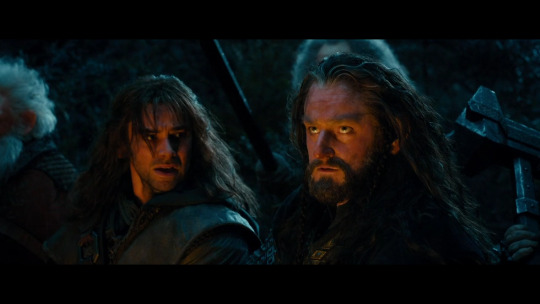
fili usually keeps to the side, be it because he observes, has less confrontational character or just knows not to interfere when thorin gets moody. when kili jokes on bilbo — fili just plays along. when thorin starts to berate them it's kili who's ashamed but fili is just there. he is so done with thorin, it seems, he doesn't have it in him to react.
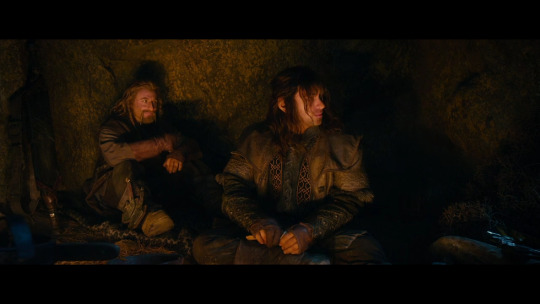
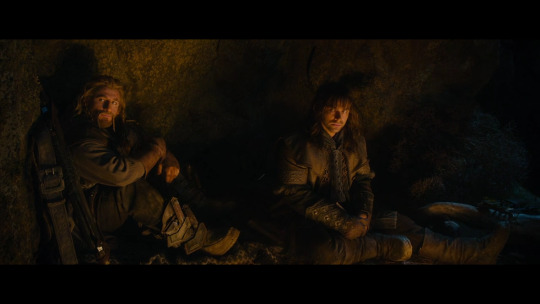

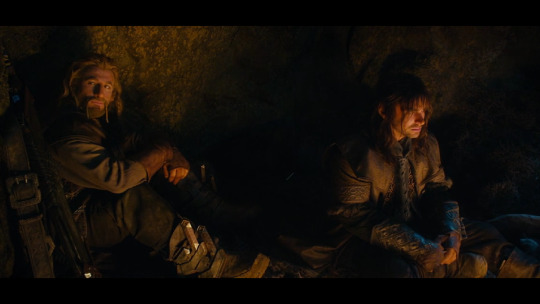
observing kili's behavior we can say that kili looks up to thorin in a more sincere, childish way. thorin is the hero of his childhood dreams, for he is the dwarf who took up on the role of his father while juggling all of his other duties. kili wants to impress thorin, wants to be good for him too, it shows in a way he jumps into fights hot-headed. and he is often ashamed when he disappoints him.
fili, on the other hand, just does what thorin says because he knows thorin will want of him exactly that. he learned a lot from and of thorin, he knows how to operate under his command. in a way, he might start to see thorin more as a leader rather than a father figure.
and it might be for another post but we see fili get openly confrontational only in 'the desolation of smaug' and only because kili is in danger. no matter how important it is for thorin to raise a king out of him, fili is still going to put his brother first.
he protests:
first time is when thorin rushes everyone on the river bank while kili needs healer's attention because of his leg.
second time — when thorin wants fili to go with them to erebor and fili choses to stay in laketown with kili who's gotten worse. thorin needs fili there with them because he is the next in line. fili's priorities lie with his brother. and that's probably the most loud conflict fili had with thorin in the whole trilogy. that was the conflict of interests.
the most loud conflict kili had with thorin, though, is in 'the battle of the five armies' when he finally had enough of thorin hiding behind a wall while the rest are dying for them. he almost lost respect for thorin and that was his last attempt to bring him to his senses because this thorin was not his childhood hero, was not the person he looks up to and the matter at hand wasn't just his foul character. it was the conflict of morals.
and i find that beautiful.
#it might have already been pointed out#but i found it so interesting to see the way the conflict but push trough#they are family#and family always has conflicts of morals and interests#kili and fili love thorin and respect him#hence why they're on this quest#but sometimes the uncle is unbearable#and sometimes they're insufferable#the family dynamic is what i am living for#thorin oakenshield#fili#kili#the hobbit an unexpected journey#the hobbit the desolation of smaug#the hobbit#may thinks thoughts#character analysis
325 notes
·
View notes
Text
I don't think Jayce was ever the one who was against Hextech weapons. I think that was always Viktor's side of the partnership, and I think this for a few reasons:
1 ) Jayce comes from a family of tool makers. Weapons are tools. Jayce's earliest drawings of himself as a mage is him holding a magical hammer. I don't think Jayce set out to make magical weapons but I think he was always open to the idea as that drawing shows us.
2 ) Viktor comes from the undercity, which no matter how you look at when he would have left it for Piltover, was often damaged and harassed by armed Enforcers. Just based on his upbringing, Viktor would be very aware of the fact that any weapons made for Piltover will almost certainly be put in the hands of Enforcers and those will be used against people in the undercity. Jayce does not have this social awareness. I don't think Jayce was at all malicious, just naive,. According to Caitlyn, he had zero political interest before becoming a Councilor and really everything he knew or thought about the undercity came from his partnership and love for Viktor.
3 ) Jayce is genuinely torn on the need for Hextech weapons because again, this isn't a deeply held belief for him in S1, this is him being supportive of Viktor's vision for their shared dream.
Jayce let Viktor be the moral guide for something he didn't really have a strong feeling about one way or the other. This is why he's so torn in S1 when it seems like they might actually need Hextech weapons in Piltover to survive against a Shimmer-armed undercity (in a classic theme of arms race escalation and all it entails that permeates the show). The narrative demonstrates though that this is Jayce's naiveté at play to think the weapons could be used only against their intended targets. Weapons once made will always be used, including against children. Viktor already has this awareness that weapons will be used against the undercity, Jayce gains it through the attack on the Shimmer factory and the death of a child bystander who looks like Viktor. To Mel's credit, she also urges caution and backpedals on her own desire for Hextech weapons in a bid to deescalate the conflict.
4 ) In S2 Act 1, Jayce is all-in on Viktor's vision for Hextech, because he's mourning Viktor who is non-responsive in the Hex cocoon and close to death. Mel, who in 1.09 realized that Jayce and Piltover matter more to her than her mother's approval, also stands up against Hextech weapons.
5 ) But, and this is critical, Jayce has always fundamentally seen Hextech as a tool that can be used for many purposes. That's why when the situation escalates, he pushes back on Hextech weapons on a broader scale, but he is willing to bend enough to make weapons for Caitlyn and her strike team, because he loves Caitlyn and he sees this as a defensive tool to keep her safe, in my opinion, and as an alternative to a war that would be worse.
This is critical to note because Jayce doesn't have an iron spine when it comes to resisting Hextech weapons because it's not his deeply held philosophical belief the way it is for Viktor. It is a received belief that he holds to honor Viktor, out of love for him, and that can be swayed if the specter of protecting another loved one arises. Jayce is wildly conflicted about this, I believe, based on his expression in the forge after he makes Caitlyn's gun, but this is a man who cannot bear the thought of losing another loved one after everything he has gone through.
Hextech was always about love for Jayce, not philosophy, because he is not ideologically driven and never has been, it was always Viktor's ideals he was supporting and he would never fight as hard on that point as Viktor would as a result.
Thank you for coming to my TED talk ;P
566 notes
·
View notes
Text
Honestly I've never had a bigger want to become a movie director than when thinking about making a Frankenstein adaptation THAT ACTUALLY KEEPS EVERYTHING INTERESTING ABOUT THE SOURCE MATERIAL
I daydream about this
I NEED an adaptation that actually goes into it. Show the fucked up family stuff while Victor narrates it aa idyllic, SHOW VICTOR BEING 19-21 WHILE MAKING THE CREATURE, show the Creature learning to speak from the Delaceys, show his worldview being entirely shaped by paradise lost and the ONE romantic relationship he saw giving him the bride idea, show Victor being ill, disabled, traumatized, go into his internal conflict, show the fucked up nature of Justine's trial, how Victor becomes more aware that he'll be perceived as crazy if he speaks up every second of it, how the law is corrupt and sentences by a judge can have been coerced and say nothing about the moral standing of the victim, especially when also bringing religion into the mix, how the law continues to be fucked when Victor is jailed after Henry's death, a shell of a man he used to be, and taken out by his father because he has influence, show Victor's bond with Henry, with Elizabeth, explore the messy and disturbing relationship of Victor and Elizabeth where they always saw each other as siblings but were also promised to one another by Caroline ever since Elizabeth arrived, how Caroline manipulated Elizabeth to basically relive her own trauma, how her dying wish left them tied into something that neither of them expresses real want for in the whole book
THERE'S SO FUCKING MUCH
#I would do like a one season series if I could just to really go deep into all of this#Frankenstein#victor Frankenstein#henry clerval#elizabeth lavenza#frankenstein's creature#frankenstein's monster#justine moritz#alphonse Frankenstein#caroline Frankenstein#Frankenstein 1818#gothic literature
777 notes
·
View notes
Text
Thinking about the role of the "love interest" in superhero media and how poolverine subverts this.
The "love interest" in most movies is just a placeholder. Boring. Tame, Predictable.
This is especially true in action media, wherein romance takes a backseat and is often seen as an add-on rather than a main plot point. Romance is either a source of conflict or motivation that serves to drive a character arc forward, but no more or less.
Take, for example, Vanessa. I love her character. Her personality and character are fascinating. However, especially in Deadpool 2 and 3, she serves more as a device to move the plot forward rather than a genuine character. The first movie established her character and importance, so it's understandable why Wade chose to hide his identity and how he slowly came to terms with his new identity. She helped move his character arc of self-acceptance forward, yes, but she also existed as her own entity.
In the movies after this, she isn't treated with the same care. She's used as a central motivation in Deadpool 2, a force that drives Wade to save Russel and confront Cable when his character motivations aren't easily tied to morals. However, that's it. She isn't fighting alongside him or given the same treatment as the other important "family" characters. In Deadpool 3, she's treated with even less care, only having short scenes at the beginning and end of the movie to give Wade a representation of "home."
This isn't to say Vanessa isn't an important character and shouldn't be treated as such. However, the purpose of having a "love interest" in an action movie's plot isn't just to have someone to love. It's almost always to have someone who can be kidnapped or killed to spring the main character into action. It's someone who fades to the sidelines so the main character can show off while showcasing their relationship success.
Consider this: in all of the Marvel comic universes, Deadpool and Wolverine have had many different partners. Different names, different faces. It's common for the "love interest" of a superhero to be seen as an accessory that changes shape depending on the comic artist or franchise. After all, they don't need a cohesive identity to serve their purpose as a "general, digestible reason for the main character to act."
Everyone understands how love can cause people to do crazy things. There is no further elaboration needed, even for morally grey or black characters. It's an easy way to make an understandable motive for the audience. Suspension of disbelief.
And yet, the superheroes remain the same. They get to keep their identity throughout different media. It's always Wolverine and Deadpool. Logan and Wade. Even if they have slightly different plotlines, their core characteristics and intrinsic identity are constant.
Logan could have Jean Gray. Or Mariko. Or Silver Fox. He can have anyone play the role of "love interest," a role that can be shapen by a ball of clay and changed entirely to fit the narrative.
But his "rival" and "best friend" in the multiverse will always be Deadpool. They're notorious for being referenced in each other's media. For fighting. For working together. They are A Set.
This is why I'm so much more drawn to Poolverine than other ships. Wade has different love interests depending on the media type. So does Logan. I can't tie in knowledge from different interpretations into the romance because the love interests are fluid. But with each other, they interact in almost every universe. Have a consistent bond. A "standard." They're soulmates, in a way, forever destined to meet and be important to each other.
This is setting aside how female love interests are treated in male-oriented media in general. They're normally seen as someone to be protected, to stay at home, and welcome back the hero when they return. Some are allowed to be strong, to have abilities, but rarely ever do they stand on equal footing with the male main character. Not where it matters.
This is exhibited in both Wolverine and Deadpool's movies. Vanessa is introduced as a "badass," someone who's part of the underworld and knows how to fight, yet she's often placed in the damsel in distress position. She could match Wade before his mutation, maybe, but after he dons the mask and becomes Deadpool, his work is over her pay grade. The same happens with Mariko in the Wolverine movie: she's initially introduced as someone who can fight, but Logan ends up protecting her almost entirely and is responsible for rescuing her from her kidnapping at the end.
It creates an emotional rift between the side of the "hero" and the side of the "love interest," because it feels like they aren't fighting together for the same cause. It feels like the love interest is treated more as a "reward" for the hero to come back to after saving the world rather than a person.
When the entire movie follows the perspective of the main character as they fight, and action scenes are primarily used to invoke emotion, it feels lackluster to have the love interest stay at home. The most intense moments of emotional connection are typically portrayed between the hero and someone else who understands their suffering who they're trying to reach, such as a villain or rival or friend.
Love interests are never on the same "playing field" as the main character and thus can't relate to their struggle. The director tells the audience that they should be happy or sad when a love interest is on screen, but they don't show the same level of emotional depth when the main point of an action movie is action. The entire premise of the main character is action, and yet the love interest is absent from it. Or a victim rather than a player.
This is why Poolverine subverts this trope. You have two people, each with their own franchise and life. Each with their own skills. Each with similarly powerful abilities.
They are equals and are treated as such by the narrative. They take each other seriously and have an emotional connection because they understand each other's suffering. They both are out on the battlefield, fighting the same war and overcoming their differences. They both are allowed to have "cool" scenes and "sad" scenes and "funny" scenes. They both are given the spotlight to experience character growth and have their own unique internal conflict because they both are strong characters who are narratively important.
They both have chemistry. Which is nearly impossible to attain when the love interest isn't even in the lab.
#poolverine#deadclaws#deadpool 3#deadpool and wolverine#deadpool movie#kitkat#logan howlett#wade wilson#wade/logan#wade x logan
230 notes
·
View notes
Text
Honestly the most interesting thing about the Jiang interpersonal dynamics that is being totally slept on is how Jiang Fengmian's power as head of the family affects everyone, including him.
Yu Ziyuan knows Jiang Fengmian won't use his power against her unless he feels like he needs to, and that he doesn't fear her and isn't going to feel like he needs to act in self-defense unless she attempts significant physical harm, so short of that she can do whatever she likes against him, and he won't resist.
But if the collateral damage to the kids of her verbal attacks on him goes above a certain level, he says one word and she stops.
He just goes, 'wife.' ('My lady' but it's just a polite term for wife.) Sort of disapproving. Same kind of way he talks to Jiang Cheng when he acts like a shithead, but without the subsequent attempt at an ethics lesson.
And bam. Momentum halted. That line of attack is out of bounds. Nobody likes this, but good god it works.
And because they both know he ultimately has all the power, that Yu Ziyuan's lifestyle of privacy and doing exactly as she pleases at all times and so forth is all something that exists by Jiang Fengmian's generosity and sufferance, and she hates it, and he's not comfortable with it either, he sets that boundary really high, and she gets away with all kinds of cruelty because it's all stuff she's strictly allowed to do, entitled to do. So he'd be abusing his authority over her, by constraining her right to exercise her power within normative bounds over the people she outranks.
Even if she's using it harmfully and in a way directed by spite, these are her rights, she's not technically abusing her power, and her primary target in all the episodes he actually witnesses is him who outranks her; she's not being one of those mistresses.
So he'd be overstepping if he tried to constrain her, he'd be one of those husbands. Just like she always accuses him of.
(This is why she keeps insisting that she's also the master of jiang sect and he's 'forgetting' that in contexts where it doesn't make a huge amount of sense.)
Anyway, the fact that it's impossible to unpick where Jiang Fengmian's moral principles stop and his conflict-avoidance kicks in with this relationship is so much more interesting than the weirdly sexist readings I keep seeing, where it's all the conflict-avoidance and he's an unmanly loser who lets Yu Ziyuan bully him and his kids without ever standing up to her, for no good reason. When actually they have a really interesting and fantastically realistic toxic relationship.
He has a good reason! His reason is he's uncomfortable with the patriarchy! And guilty that his wife is miserable! And that he doesn't love her correctly! So he gives way as often as he can, trying to fix it!
But it doesn't fix it, because no amount of giving in to her gives her cause to trust him, and if she doesn't trust him and she knows that if he actually cares about an issue her ability to get her way will disappear, she can't feel secure about any of it. And therefore everything, especially Wei Wuxian the symbol of that fact, makes her angry and Want To Punish.
#hoc est meum#mdzs#yu ziyuan#jiang fengmian#jiang family#i am OBSESSED with them#meta#marriage#gender#character meta
557 notes
·
View notes
Text
12 Traits to Give Your FMC That Are GUARANTEED to Make Her More Interesting!

She has an unlikely set of skills: Stick her with a set of skills or talents that might not pair well with her occupation or personality. Maybe she's a hellish warrior who's a beast at knitting. Maybe she's a wallflower with a four-octave singing voice. The combinations are really endless, and this is a great and easy way to inject some extra charm into her.
She doesn't exactly conform to societal norm views: And I mean this more than just not adhering to traditional gender roles. Maybe, in the scope of your world, she has a set of views that many might consider unorthodox, or maybe she's just a little more "off the wall" with her opinions than the other characters around her.
Identity crisis, identity crisis, identity crisis: Have her balance different roles that seem like they have no business mixing together. Have her face a trial that makes her question everything. Have her wrestle with the skeletons in her closet (literally or figuratively, whatever you think fits her situation better). Not only will this help make her more relatable, but its a great way to give her some internal strife.
She doesn't know who to support: Is she stuck in between two warring families? Or, maybe the will of her superior vs. the will of her beloved? Whatever the struggle is, giving her a sense of uncertainty around who to support can go a long way in terms of her own conflict and keeping reader interest.
A strong sense of justice goes a long way: I LOVE a girl who has a strong moral compass. Give us the girl who's up in arms about serving justice in the way she believe is right. Bonus points if she will do absolutely anything and everything to defend her ideals. Extra bonus points if her sense of justice doesn't exactly seem "kosher" on paper...
...or maybe it's ever changing: But, on the flip side of that, a more flimsy sense of justice--one that almost appears to change with the tide or time of day--can also pique some interest. This is more than just plain grey morality; this is morality that can flip for any reason.
Traits that don't seem to match up: Like the skills suggestion, this encompasses general personality traits rather than skills. Give us the fiercely independent woman that absolutely craves human touch, or the high IQ genius who has no sense of emotional intelligence, or the fearless leader who wants nothing more than to fall to the background. You can really go nuts here, too!
She's obsessed with SOMETHING: Whether its an obsession or an addiction, this is something I feel like I don't see a lot of in female characters. It could be a substance, or a person, or even a concept. Bonus points if she compromises whatever she might be doing to touch on this obsession. Drive it home for us, writer.
Double life, maybe?: Whether its metaphorical or totally literal, this trait is a great way to dig down to her depths and tack on some intrigue with her character. Is she really hiding a secret identity? Or is she trying to reconcile two contrasting parts of herself?
She's confident in her femininity: Look, I love me a woman who defies gender norms and goes against the grain of femininity, but in that regard, I feel like there isn't enough writing about characters who embrace it. That doesn't always have to be falling into gender roles, but maybe she's really in tune with her nurturing side. Maybe she's the picture of grace. Maybe she just really likes dolling herself up and looking pretty. There's nothing wrong having any of these traits, so having her be confident in them could be a breath of fresh air!
She knows her tastes and she knows them well: Is she goth? Is she coquette? Is she all glam? However she rolls, she knows how she wants to look, and she sure as shit embraces it in her overall aesthetic.
She's a leader...and an imperfect one at that: Yes, this is a dig at the classic "Strong Female Lead." The fact of the matter is that even the best leaders are imperfect, so if your FMC finds herself at the front of a rebellion or an organization, really emphasizing her imperfections can give her some nuance that doesn't make her seem totally and completely untouchable.
As always, gooooooooooooo fucking write something today <3
(If you like my guides, prompts, writing, or art, consider supporting the blog today! All donations help me keep this thing up and running and all are appreciated <3)
#morally superior writing tips#writer#writers#writing#creative writing#writeblr#writers on tumblr#writers and poets#writerscommunity#writing community#on writing#character creation#original character#character concept#originalcharacter#character development#fiction writing#writers on writing#character writing help#character writing#fiction#writing advice#writing tips#story ideas#character idea#female writers#female character#how to write
126 notes
·
View notes
Text
this took a millennia to make cause i kept getting distracted and gathering screenshots to back my points up was incredibly time consuming
but it has been done. anon from how many days ago i hope you are happy
A little of Pure Sydney's flaws
There will be two parts to this cause on god this is long. On this part I will be exploring flaws that tend to be a bit more visible with pure Sydney
This is in no way a complete analysis, I definitely have missed many more of Sydney's flaws, and because Tumblr is a bitch and a half, I regrettably cannot jam as many screenshots from the game/its codes as much as I would like. But I hope this post could act as a good point of reference regardless for any fans of Sydney, or people looking to explore more of their character out there!
Continuing under the cut.
So.
What’s the deal with Sydney? What’s wrong with them, what are their flaws and what make the relationship between them and the PC so toxic?
Well ain’t there just so much to unpack.
In short, Sydney at their core is a spineless, directionless, malleable individual that important influences in their life can easily shape, be it their family, the Temple, or the PC.
Sydney, as they are today, was raised with beliefs upheld by the temple. Something they are deeply religious, devoted and grateful for. However, as we all know, some of those values can be extremely morally questionable.
Speaking of deeply devoted let’s start with Pure Sydney, shall we?
Victim blaming tendencies
One of the ideals Sydney was raised with is their extremely victim-blaming mindset. Which I have shown here
2. Lust and internal conflict
Something else that fascinates me greatly is that regardless of their state, Sydney is always tempted by the PC. PC’s existence and presence alone are pushing Sydney towards the pit of sinful desires no matter if they are Pure or Corrupted.
The first thing that comes to mind is when accepting their confession results in a decrease of Sydney’s Purity stat:
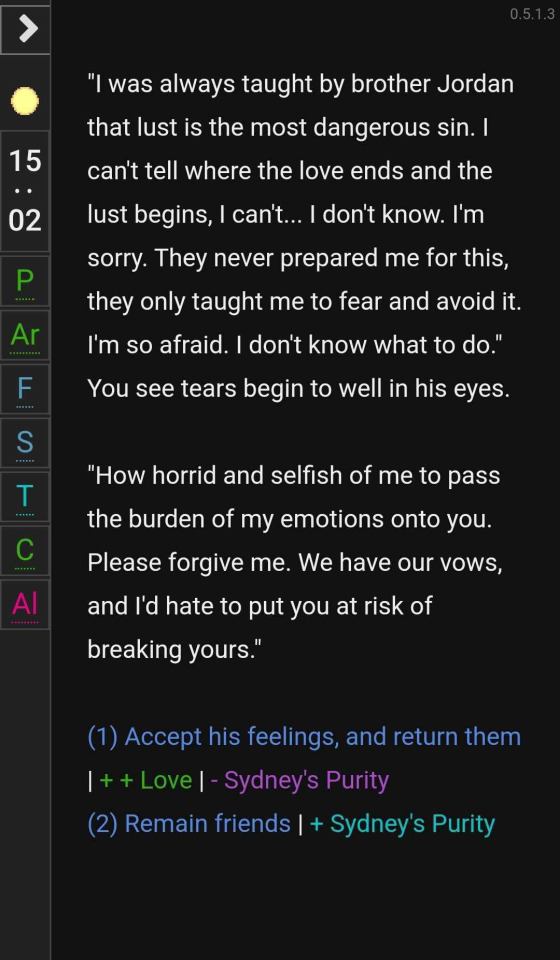
The notion of accepting Sydney’s affections is seen as an encouragement for them to fall towards sin.
Being in a relationship with PC means they are constantly fighting their own urges and desires. Being taught their entire life that these feelings are wrong, Sydney suffers from tremendous guilt. Even when promised and permitted by the Temple, Sydney still finds physical intimacy with the PC sinful:
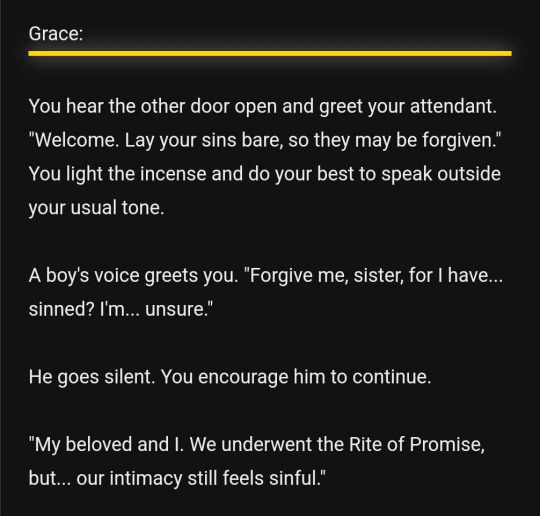
These just go to show how deeply buried Sydney is in the Temple’s teachings, unable to stray from it. Which is a perfect segue into their next flaw
3. Attachment to the Temple and blind faith.
Even from the latest confessional scene added, Sydney clearly cares about PC’s wellbeing and displays great concern for them, almost breaking out of the ideals they were raised with just to defend their beloved. But they are not quite there yet. They still seek out for the Temple when they are faced with these doubts. They think that they are doing something wrong for prioritizing the PC’s best interest over the Temple’s teachings.
Sydney is INCAPABLE of detaching themselves from the Temple. The Temple is just such a big part of Sydney’s character that no matter what, they will side with the Temple before they think about the PC when forced to make that choice.
And in a way, Sydney’s blind faith is encouraged by the Player for choosing to keep them Pure. The PC is essentially acting as another shelter, shielding, “protecting” them. The PC never expressed that they wanted a change of mindset from Sydney, so Sydney never had a change in mindset.
And if you played the new confessional event, you would know that you as the player never had the option to either. This might have been intentional. But I will expand on that later.
More showings of Sydney’s blind faith can be found in littler events while praying with Sydney in the Temple, where they would turn a blind eye to fellow followers being punished:
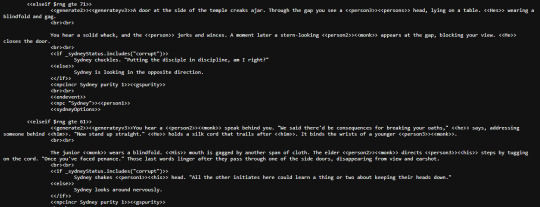
A bit more about their attachment to the Temple I have also mentioned here.
4. Superiority/Saviour complex
Another aspect of Sydney that people talk about, but I don’t think quite enough, is how aggressive they can get, specifically towards those they deem as sinners. This is a trait shared among both states of Sydney.
For example, the beach date:
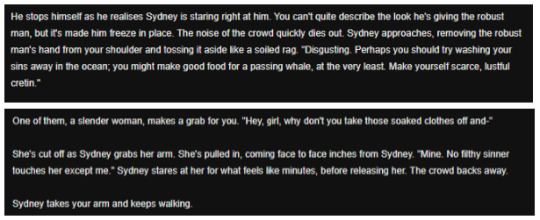
And several more.
Though, pure Sydney might be a tad worse at this. As they seem to find themselves more righteous than sinners:
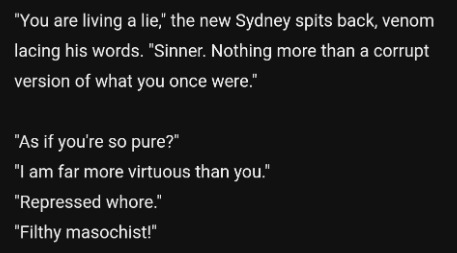
If they are the one taking confessions, pure Sydney is often more judgemental compared to the more empathetic corrupt Sydney:
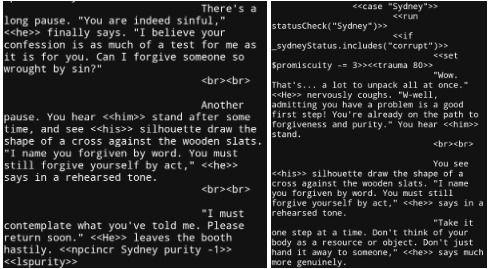
When PC as a member of the Temple is caught masturbating by Sydney, they take matters into their own hands:
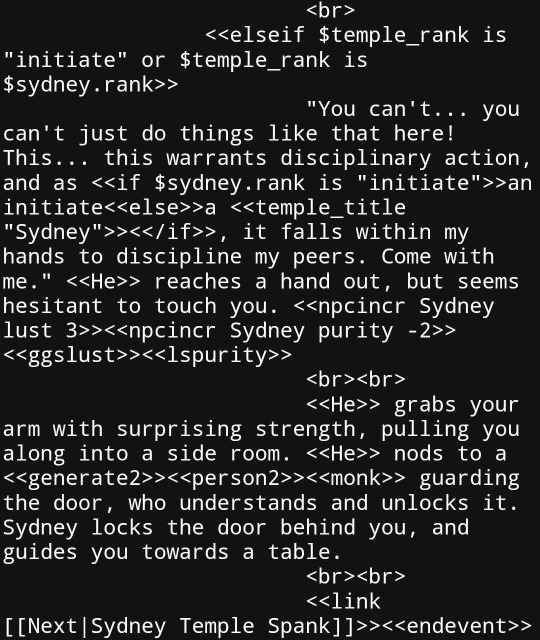
They also display a bit of a saviour complex from their opinions about the PC at low Purity:
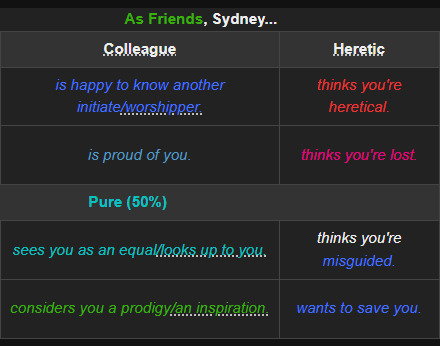
5. Dumb teenager
Just a small thing, but I feel like most people just brush over the fact that pure Sydney practically proposes to PC at high enough lust.
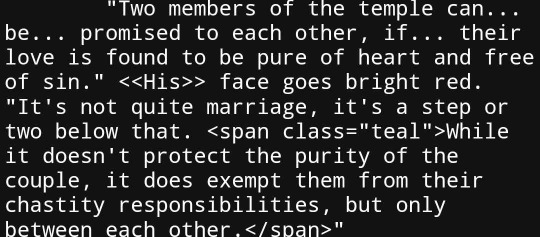
I think I don’t need to stress just how insane it is to propose to someone you haven’t known for long. Just to what? Have sex? Loser behaviour.
I can't wait to explore their flaws when corrupted :3
When kept pure, Sydney has so many interesting flaws that make them incredibly humane and a little irritating, but that's the charm of their character! They are deeply troubled and blinded by their own devotion that they are ignorant, a bit arrogant and even self destructive. It's what makes Sydney... Sydney and I wouldn't have them any other way.
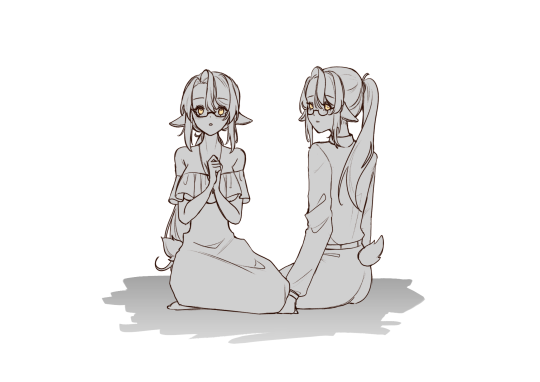
#dol#dol sydney#sydney the faithful#sera rambles#technically#sera answers#cause this was asked by an anon and i just sort of didnt answer#woops#sorry anon i saw sydney suffering and forgot everything you said prior#i hope youre seeing this#when is the sequel coming? idfk when i finish drawing the little doodle for it but no promises#degrees of lewdity#tumblr should let me post more than 10 images...#i deserve yapping rights
65 notes
·
View notes
Note
I got an ask about semantics, that Dean is often branded “toxic” and that it tends to be overused. Semantics isn’t my strong point, so i thought I’d come to a Dean historian. :)
Do you think this is overused for Dean?
I find it’s a much more interesting conversation when we describe his behavior for what it actually is—whether he’s being stubborn, dismissive, hostile, or even emotionally guarded. I think some of the specific ways he copes—through joking, deflection, self-sacrifice, breaking objects, or pushing people away—are very human.
I think it was @ilarual that pointed out that Supernatural isn’t a Saturday family drama… it can’t be divorced from its religious horror fantasy roots. The characters’ struggles—whether emotional breakdowns, crises of faith, or cycles of self-destruction—aren’t just personal; they’re heavy with cosmic forces, biblical themes, and the weight of fate itself.
Anyway, it’s hard for me not to see “toxic” as a copout word. (Forgive me for dumping on you.)
Hi Shal! I'm so honored to get two asks from you!! I was carrying them around in my head all week though I didn't have time to answer :(
I'm trying to gather my thoughts about this. Because, yes, I agree that calling Dean "toxic" is a) not accurate and b) a cop-out for analysis. And I certainly agree that that word is overused by deancrits particularly.
I think I'm probably not grasping the full weight and meaning of ilarual's point but from what I'm getting, I think that's a really important element to how dean (and sam and cas and jack etc) act and how we evaluate their actions. The stakes are always so damn high for all of them.
Stepping back for a moment, when reading fic I'm often a little frustrated if Dean is characterized the way he is in canon but most of the contexts that have made him behave, react, be that way are removed. Because in some of those instances, I think some of his behavior reads as pretty ungrounded from reality and maybe more into the kinds of patterns which coalesce into toxicity. (I mean I also think fanon makes people lean into these kinds of characterizations of dean - disaster bisexual, repressed and biphobic, and various other things which are incomprehensible to me)
But in canon, I tend to personally struggle to define any of TFW et al as "toxic." I recall a conversation I had with a friend after watching Lucifer Rising where she was critical of Dean for yelling at Cas when he was trying to break Cas free of Heaven's plans to bring on the Apocalypse. She said he was being mean. I remember feeling so confused - surely if the stakes are the whole entire world, you are well within your rights to raise your voice?
I think all of TFW has moments of being not particularly kind or good communicators or steamrolling each other's emotions or various other things which are kinda yucky interpersonally. But it's pretty much always because the stakes are so fucking high; the world is in peril; there isn't time to have a conversation; they are dealing with catastrophic grief while also having to do crisis management. Most of the conflict in spn happens when the characters are going through what, for most people, would hopefully be the worst day of their lives. And for our boys that happens again... and again...
I am not saying all of this to say we can't call out specific instances of them not being very kind to each other - Sam strangling Dean, Dean aiming a gun at Sam, Cas beating Dean up in an alley, Dean beating Cas up in s10 etc etc. And I also think it's important to talk about the ways these kind of moments constitute or break from their common behavioral patterns - or don't. Eg in your post about Amara and 15.15, you pointed out that betraying and forcibly sacrificing someone who isn't really a direct threat and is learning and growing is not in line with Dean's usual morals - a break from a pattern. And people often point out Cas' pattern for trying to problem solve solo. (These are just examples and by no means comprehensive!)
All this is to say that I actually think that if they all ever got to be in safe, calm world, got some space and time, they all really really do have values around talking things out (we see this again and again) and listening to the differences in how they feel or want to handle situations. Sam and Dean alone have a staggering amount of conversations at the end of episodes where they had conflict. Dean and Cas have multiple on-screen conversations about what caused tension between them and many off-screen conversations which are alluded to. I don't think any of them are perfect communicators. I think they all have various amounts of introspective capacity and effort at various times. They all have some well-worn and not all that healthy emotional go-tos because of the traumatic lives they have all lead - which would take time and safety to unlearn, unpack, and change.
I know your question was about Dean but there's not much I really have to say about Dean which doesn't apply to the others. I am specifically a die-hard Deangirl(gn) but this logic is what would keep me from making a long post about how Sam or Cas are Toxic(tm) even when I'm seeing them exhibit a specific behavior pattern which is annoying to me.
But the last thing I'll say is much more Dean specific and that is that Dean is sort of always just supposed to absorb and roll with everyone else's opinions and analysis and choices and not react with his true or full emotions or else he gets these labels thrown at him. This reminds me of a time I saw a Casgirl(gn) claim it was okay for Cas to beat Dean up in 5.18 because he was really mad at Dean... ? Or what we were talking about a week ago with the Mia Vallens therapy where Sam's frustration and hurt and anger are listened to and validated - including him lashing out at Dean - and the grief and frustration and cornering that Dean is feeling are somehow not supposed to affect the way he's acting? I'm certainly not the first to point this pattern out by any means but I do think that that's a big contributing factor in labeling Dean toxic while having explanations, exceptions, and excuses for the others.
Lastly, you are never dumping on me though I fear this reply is at risk of being a dump <3 I also don't even know if I really answered your question...
Oh wait, one more thing. I think the way fandom can be so focused on looking for the Victim(tm) and the Abuser(tm) means that, especially in many moments in spn, they are utterly missing that one of the inherent consequences of whichever godawful shit the characters are facing is that their beliefs about how to handle it will be in tension. And that's gonna suck for everyone. But it's actually no one's fault that they're arguing or disagreeing about how to handle it.
#dean studies#pine yaps#sorry there aren't more citations in this. i just felt like there was too much in my head....
63 notes
·
View notes
Text
Ok maybe I do have more thoughts on the Medea interactions and how they reflect on Melinoe:
I’ve noticed that the discussion around Melinoe’s morality tends to focus on her proximity to the Olympians but I think there’s also something to be said about the moral grey area that witches fall under. She didn’t grow up in the House of Hades or Olympus, she grew up in the Crossroads and her perspective is influenced by the guidance of witches. And while Circe and Hecate are a little coy about their misdeeds, Medea stands out as the one who really owns the darker aspects of her craft and talks about the suffering she inflicts with pride. In contrast, Melinoe is…not pure but very invested in the idea of doing the right thing and being in the right. So there’s this contrast between them, Melinoe clings to moral justification for her task while Medea isn’t held back by moral dilemmas.
And I think part of that is because Medea pursues her craft to satisfy her own vengeful desires while Melinoe hasn’t gotten to fully explore her identity as a witch yet: They both use their craft in vengeful ways but Melinoe always has this degree of separation from the root conflict. (Nemesis gets at this idea quite a lot actually.) The titans are retaliating for things her family did long before she was born, yet Melinoe is tasked with cleaning up the mess. And when she does take time to herself, she often feels guilty about it. In contrast, Medea gets the satisfaction of personal revenge and is content to use her curses on anyone who gets on her bad side.
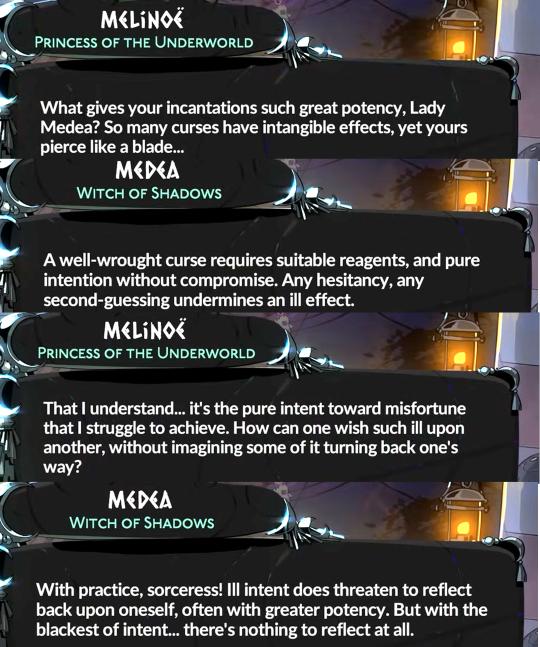
It’s that intent that differentiates Medea from Melinoe, I think. No matter how impressive her feats, Melinoe is ultimately a weapon wielded by someone else and lacks pure intent of her own so she often hints at feeling…morally conflicted when talking to Medea. While Medea draws her power from the “blackest of intent” , it seems like Melinoe is forcing a tough exterior, filling a role that doesn’t always come naturally to her. And she wants to know how Medea manages to pull it off so seamlessly. Medea’s “with practice!” line is funny but also, if Melinoe is going to eventually become the goddess of nightmares, maybe she will get there with practice…
I have a suspicion that her arc won’t be about “becoming the nicest person and making everyone proud” but instead, channeling her craft to achieve her own goals without seeking the approval of a higher authority or abiding by someone else's vision of the future. Not perfectly restoring the Age of Gods or the Golden Age of mortals but instead bringing about a different future. She may end up letting her compassion guide her but Prometheus doesn't call her an agent of good or evil, he calls her an agent of change. And it seems like witches in this game are portrayed as catalysts for transformation.
As her understanding of the world grows and shifts, I think it’s interesting that Medea is one of the people Melinoe looks up to and confides in. She asks Medea these very earnest questions about mortals and gods and Medea grants her a joyfully bleak perspective every time:
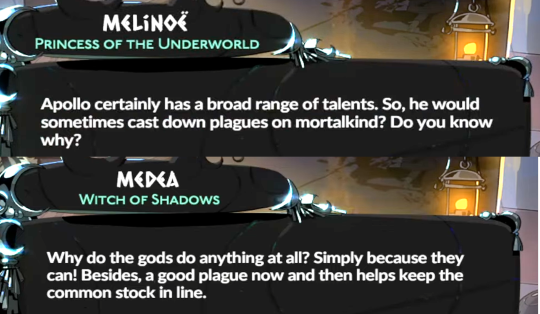
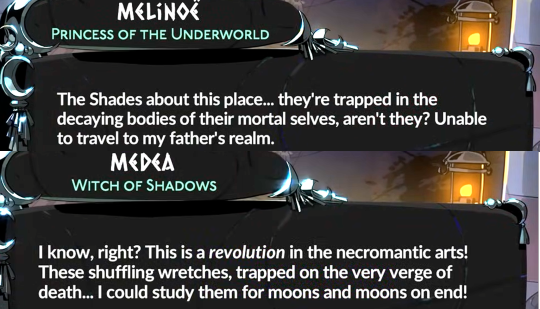
Medea also has this consistent tendency to disregard mortal suffering, to compare them to livestock and talk about them in terms of how poison-susceptible they are. I get the sense that Melinoe's perception of mortal weakness is influenced by these kinds of conversations:
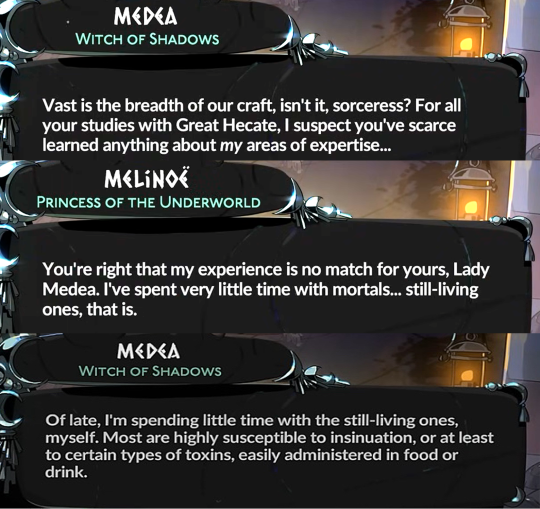
Melinoe's understanding of the world is shaped by an interesting range of perspectives and is somewhat...shaky and incomplete for now. I think she isn't quite sure how to reconcile her more compassionate impulses and the responsibility that she's dedicated her life to:

Although she adheres to a very black-and-white set of beliefs for the sake of completing her task, there's also hints of uncertainty in her conversations, especially with Medea, a more experienced and self-assured witch. I think Melinoe's character development has the potential to go in a lot of interesting directions!
#it's long whoops!#i know this is an art blog but need to talk about witches#hades 2#melinoe#melinoë#hades ii#hades game#medea#hades medea#medea hades
142 notes
·
View notes
Text
Thomas: what role would you want to play in a novel?
Roman: the hero of course! The dashing protagonist who saves the day, defeats the evil, and woos the love interest!
Remus: the villain! Just maniacally and magnificently evil! I'm talking Renaissance Era Disney villain evil!
Janus: the morally grey antagonist who has a point.
Logan: The scientist. I would enjoy knowing everything there is to know about every field of science, and then use all of it to succeed in the conflict.
Patton: I'd probably be the best friend! I'm always here to support my family and not get support myself -
Virgil: I literally just want to be a nameless background character who is only there for set dressing and isn't impacted or affected by the plot in any way.
#sanders sides#character thomas sanders#roman sanders#remus sanders#janus sanders#logan sanders#patton sanders#virgil sanders#tropes
35 notes
·
View notes
Note
Your advice to the letter-writer whose friend is a former abuser is interesting to me! I largely agree with the specifics, but I'd have added advice to be careful with how the former abuser treats the letter-writer. I might also advise them to be careful whenever the former abuser describes conflicts, as they might be likelier than average to use a woe-is-me framework. I would recommend caution with anything the abuser suggests they do that might cause them discomfort or humiliation, even if it sounds righteous in theory. I realize this is not very fair of me. The former abuser shouldn't have to live with increased carefulness and suspicion from their friends. Maybe it's not a real friendship if you're always wary about your friend potentially turning on you. But purely pragmatically... a lot of former abusers do abuse again, even if they had changed, sincerely, for a while. And "my friend who knows my history and stands with me, even losing some other friends in the process" is a prime target for Abuse II: Abuse Comes Back But In A New Enlightened Way. Deciding to have solidarity with a former abuser is a very moral thing to do, but it's also a trait some abusers are great at warping for their own benefit. Again, I know I'm being unfair, but I keep seeing this happen. Sometimes the friend gets sucked into a narrative where they eventually blame the former victim and become increasingly protective. Other time they say very clear-eyed things but ultimately still end up physically or sexually or emotionally mistreated.
I guess my question is, you say you believe the abuser fundamentally changed, so what does that look like to you? Are you able to fully relax around people who've abused in the past? Abuse is the result of circumstances, but it's also a sort of skill; how do you trust people to never use that skill again?
Great things to be aware of, honestly, thanks anon for the nuanced and careful view.
I like your framing of abuse as a skillset rather than a type of person -- and it's a skill that a whole variety of people wield, including sometimes those who are identified by most not as abusers, but as crusaders for justice or even supposedly for victims' rights. Having been abused and having also learned to be a canny social manipulator, I do see abuse as a skill that gets taught in dysfunctional groups and family systems, and which we can all potentially fall back on when we're backed into a corner.
Knowing how to recognize the skills of abuse being utilized (and maybe even more importantly, how you feel when a person leverages certain tactics against you) is really important for self-preservation in general. Being friends with someone who has a known abuse history that they are explicit & contrite about, in some ways, puts you in a safer position than if you were interceding with a more covert abuser who uses such tactics under a banner of benevolence. But it's also true that many people who come to be known as abusers were initially known as charming, and right thinking, and moral -- and it's very possible for someone who has done abuse to present themselves as such but not mean it. We can't ever really know the full depths of someone else's heart and mind, nor do we have to -- we can look to their actions and the skills they use, particularly when they are frustrated or feeling attacked.
56 notes
·
View notes
Note
Klaus and Elijah have extremely different dating preferences at the ripe age of 1000 years old. What kind of person do you think they could still both be interested in? (assuming klaus knows nothing about Elijah knowing that person and vice versa).
It makes senses that they would have very different dating preferences since they are such different people.
We often joke about them going after the same women, and it definitely happened, but there are usually ulterior motives to when it happened. Like I said in my post yesterday, I never really believed Klaus was interested in Tatia, more involving himself because he wanted Elijah's attention. Again, with Katherine, Elijah was interested but Klaus wanted her for the ceremony. The only other woman they are both with is Hayley, and we know Klaus and Hayley just "hate banged."
So we never actually see them like similar women.
That's not to say these people don't have things in common. They all tend to be fiery, strong, independent, and intelligent. Where they differ is more in their desires and their underlying temperament.
Klaus tends to be attracted to calmer people. Likely because he is the temperamental one and looks for someone to balance him out. Even the side of Aurora that he is attracted to is her calm and nurturing side. Yes, he was still physically attracted to her when she was more aggressive/less calm, but we saw that the love wasn't quite the same. Same thing with Hayley, they had a sexual attraction but it never developed into more likely due to the conflicting temperaments. For partners, Klaus tended to look for less wild people. While he admires intelligence, it's not at the forefront of his mind. I think he also finds emotional intelligence very important since he tends to lack it and needs help. Klaus is a person who needs to be the center of attention, therefore he likes partners who are good listeners and patient.
Elijah on the other hand is the patient, thoughtful, listener. He tends to go after people who challenge him. We see him attracted to physically and emotionally strong people. Very opinionated people who won't just let him get away with things. He admires leadership and intelligence. We see all of the pairings he has tend to be with women who are leaders in their communities (Hayley, Celeste, Aya, even Gia was helping Marcel lead the vampires). We admires compassion, but above that he admires people who understand there is a time and place for it.
One thing they do have in common is they tend to find themselves attracted to people with a little bit of darkness, but it presents itself differently. Klaus tends to like people seem wholly "good" but have a hint of darkness. It is a reminder to himself that even the best people carry darkness. But the "good" in them reminds him that even with all of his darkness, there is still "good" in the world. While Elijah tends to be attracted to people who present as more morally grey. Marcel made a comment that Elijah likes to "fix" people. But I don't think that's exactly it. More like, he finds himself attracted to people who aren't perfect because he understands it's more complex than "good" and "bad." He's intrigued by that complexity because he knows he doesn't always make the best decisions even if it comes from a good place (and it doesn't always). He needs a partner that can understand that.
All of that to say, I find it very difficult to find them interested in the same type of person. I don't tend to read stories where Elijah and Klaus are fighting over a character because I feel like Elijah or Klaus (usually both) tend to become OOC. Klaus may find a person physically attractive for being a leader, but he doesn't like his power to be challenged. We don't tend to see him go after people who are on similar/level footing to his power. Whereas, Elijah tends to require that. They need to be able to keep up with him and his family because he knows just how dangerous it all is.
A more "morally grey" character that Elijah would be attracted to would lead Klaus down a bad path, whereas Elijah would get annoyed with the "good" character that Klaus would usually find attracted. Not saying any of these characters are "wholly good" or "morally grey" just how they see themselves/are presented.
The easiest comparison is Hayley and Cami. They do seem similar in a lot of ways, but their difference are what make the ships romantic v. platonic. Elijah is the person in the family expected to make the hard decisions. Klaus gets to have a redemption because he can sit back and say "No, don't do that," because he knows he is not the one that inevitably will have to. In most of Season 3 and 4, Klaus gets to play the "morally good" brother thanks to Cami's influence, while Elijah was the one that had to actually fix the problems. And because of Hayley's life experiences, she understood why Elijah did the things he did, even if she didn't agree with them. She knew it was from a place of survival.
I'm sorry this wasn't really helpful for what you asked. If you have more specific traits you want me to discuss, I'd be happy to!
Thanks for the ask!
#elijah mikaelson#klaus mikaelson#klelijah#tvdu#the originals#the mikaelsons#anon ask#fandom asks#tvd ask#tvd anon ask#fandom answers#the vampire diaries#tvd#tvdu metas#metas#anonymous#andrea831 metas#andrea831 metas elijah#andrea831 metas klaus#andrea831 metas mikaelson#andrea831 metas klelijah
39 notes
·
View notes
Text
My story doesn't have a villain, so what ?
Does a story really need a villain ? What is a stake where there's none ? How can the protagonist evolve when they've got no one to face ?
In which I explain how the conflict can lie elsewhere - and it's a bit more challenging yet sometimes more interesting.
The world, and society in general. They are often a good starting point to create tension in your novel (because everything is most certainly wrong everywhere lol). For example : what happens if you don't share the beliefs of your city ? What choices can make you defy the current order and break the status quo ? It's a convenient way to plot distopian books, but it's not yet a cliché because of to the complexity of the trope and the different aspects you can explore as it is broad.
The complexity of your characters : the personal quest. The famous "You are your own worst ennemy" is a actually very effective in this case - but any other significant event, trauma, fear etc. can be consistent enough to be the core of a novel. I believe the journey is more important than the "plot" or the ending itself. The path of finding answers, healing and overcoming a traumatic event is easy to suggest, harder to write about, yet somehow always powerfull. I think it's hard to be cliché with 'personal quest' trope because everyone deals with their suffering in such different ways that you can't be exploring it twice. (Or it can be something lighter, like the pursuit of an artistic dream).
Various characters, same event. Multiple POVs are a great way of exploring all the aspects of the issue, based on the different beliefs and perceptions that drive your character. For this to be really effective, you need to have characters who do not share the same opinion on the subject. It doesn't have to be a difficult idea to come up with. For instance: in a futuristic world, you can choose what to do with your memories: keep them or erase them. Some people will argue in favour of the process (because you can erase a traumatic event), others will argue against it, saying that memory is what makes a person. In that kind of scenario, morality plays a huge role.
A destabilising event, much bigger than ourselves or a discovery that could shape the future. A destabilizing event, much bigger than ourselves or a discovery that can shape the futur. Think of that sci-fi novel where the end of the world is brought about by an incoming asteroid. It's the same thing. Either you try to avoid it, or you try to accept it, or you try to fight it. Each way is valuable to a story, if you create some consistent characters.
To conclude : we have to think a bit more about what is at stake when no one actually treathen the peace of the community. There's no manichaeism, we have to go beyond good and evil ; the solution isn't clear - sometimes there's none at all. And that's okay.
Thanks for all the kudos and reblogs, I feel relieved to see that my posts are of some help ! ❤
If it's a bit fuzzy for you, let me quickly explain what my story is about, because that's what motivates me to write this essay.
My MC is a priest in a religious town that is suddenly plagued by an unknown and incurable disease. She tries to get used to it, until her family contracts it. She manages to acquire the power of the goddess and, doing so, shakes the foundations of her entire city and society, believing that she is now able to act. There's no villain whatsoever, just a poor girl trying not to see her family dies and who has to face the consequences of her own actions.
#creative writing#novel writing#writer blog#writing#writing process#writing help#writing resources#about books and writing#writing advice#writing tips#writeblr#writing a book#fiction writing#resources for writers#writing resource#writer of tumblr#writer problems#writiers on tumblr#writerscommunity#essay#writing tools#writing journey#writing challenge#essays#writing style#books and literature#writers on tumblr
95 notes
·
View notes
Note
Your thoughts on Amy are really interesting to me because when I was watching I'll admit I saw it as another tragic scenario that's often presented in the show. Like, she found a way to live her life with her son that wouldn't have her kill people (being a mortician) but when her son was sick she turned to desperate measures to save him. It's a sort of situation we see time and time again on the show. I'll admit I didn't quite pick up on the classist rhetoric going on in the episode and while I'm not entirely sure that was intentional by the writers it's definitely had me looking at this plot point in a new light. Dean killing Amy and its consequences has always been a really interesting narrative beat because while I ultimately don't fully agree with Dean's decision there, I totally see why he did it and understand his reasonings for it. Idk how many other fans feel the Amy conflict and the arc it has the brothers go through but I do think that at least at it's core it was an interesting one to explore even if it's execution of it left something to be desired for me
Sorry to ramble in your ask box but I seriously love your metas even when I don't always agree with your opinions 💜
If you don't mind a little rambling as well: I don't know that I'd say we see this same situation time and again. We have "Monsters Who Manage". For example, Lenore and her nest (2.03, 6.19). Benny. Garth and Bess. Sometimes those "monsters" feed again despite their best efforts (ex: Lenore in 6.19).
Amy isn't like any of them though. Sam seems to want to present Amy as an addict who relapsed (like Lenore), but that isn't what happened. She didn't feed on the brains of the people she killed. That was never her goal. She just had an opportunity to do something immoral to save her kid and she did it. In the end, her being a kitsune has almost nothing to do with her actions. A human parent could have done something very similar to save their own child. Imagine if your child needed a new heart and there was a long waiting list, so you went out and killed someone else and had their heart transplanted. That's more like what Amy did. Her kid got a food borne illness or infection. Normal human children get listeria and other dangerous food borne infections/illnesses. The only way in which Amy being a kitsune really impacts the situation is that it presented a unique solution to her child being sick that wouldn't be available to other parents (fresh pituitary glands). Her choosing to act on that opportunity just kind of shows that on some level, she does think of humans (at least "lower class" humans) as food.
At the same time, I do think Dean's actions go further than a moral difference with Sam. Dean is spiraling after the events of season 6. Cas lied and then died, and when it all went to shit, Death blamed Dean for everything and Dean crumpled under the weight of those expectations (we jump further into this in the following episode). It leaves Dean hyper-focused on not making a "mistake" again (for example, trusting someone he shouldn't have). At the same time, Dean's deeply depressed and suicidal (7.02), and his outlook on life and his own family is incredibly cynical when "The Girl Next Door" takes place. He says "the other shoe will drop" in regards to Sam because he doesn't have hope that anything could ever turn out right for their family. He repeats it in regards to Amy because people never change. Everyone is doomed to repeat their mistakes for all time (Dean's despair often looks like falling into the spiral of causality instead of remembering he can leap out of its flow). He also says "People are what they are", and I do think he's thinking about Cas at that point.
Amy mingled with humans and was a part of their world, but her actions showed she saw them as food on some level... and I think that Dean looks back at Cas and worries that he was a fool to ever think Cas was (for lack of a better word) human (or at least an ally to humanity who truly respected them as equals). In 6.22, Cas tells Dean they were never a family, and in 7.01, he follows that up by telling Dean he only ever saw him as a pet. He reinforced the traditional hierarchy where humans are lower creatures to monsters—food. And what has Dean been fighting all his life? Powerful creatures who believe their physical dominance gives them license exploit humans as food. When Dean tells Amy "people are who they are"... I do think he's thinking about Cas and the trust he had in that relationship that was deeply crushed. He's scared to trust anyone again because he trusted Cas so very much and now his world has been ripped apart. He doesn't trust Sam's judgement on Amy because he trusted Cas and that backfired spectacularly. He doesn't trust Amy not to do this again. Tbh I think he's right not to trust her because she has absolutely zero remorse of any kind at all whatsoever at any point. To me, that makes it quite apparent she'd be more than happy to do the same thing again if her kid was ever sick again. Hell—maybe even if she got sick. But it does go deeper than a moral clash for Dean. He's full of despair. At the same time, his actions also aren't as simple as dropping into the doom of "Monsters bad" because he doesn't kill Amy's son. Something Sam's never really grasped is that monsterhood has never been about physical characteristics to Dean. It's always been about actions. For Sam on the other hand, monsterhood has historically been more about physical characteristics (post here). I think this also plays a role in their feelings about Amy.
63 notes
·
View notes
Text
“Make it a son for a son”
There’s a new season two promo where we hear Matt saying Daemon’s infamous line for the first time. And it has me wanting to bring up something I see with the team black fandom.
(BOOK SPOILERS)
There’s an impulse within team black to distance the characters of team black but particularly Rhaenyra from B&C by presenting it as a rogue act committed by Daemon on his own.
Now, first the book does not tell us that. The book gives us little to go on beyond Daemon’s involvement and the obvious implication that Mysaria was his KL contact to set everything in motion.
The rest of the details are mostly speculation.
Rhaenyra’s involvement is limited to a letter from her husband promising that Luke would be avenged. We have no further details on what she knew or how she reacted. Which also gives the show lots of room to present Rhaenyra’s feelings about this revenge plot however they like.
But what I see often in this attempt to isolate B&C to a Daemon-plan not a team black plan, is a misunderstanding of Daemon as a character.
In a bid to defend Rhaenyra’s innocence in the act, Daemon can not just be the lone perpetrator, he is also the monster.
Except this is an intensely human act.
A personal attack.
He could have killed all of Aegon’s heirs in that moment. As well as TG’s two queens. That would be the political move. Taking out the other side purely for political gain regardless of the innocence of the children he attacked.
And this is where those arguments from even within team black fall flat to me.
Because this is not political. This is personal. This is a grieving parent and husband who has no control and could not prevent the initial attacks on his family.
It’s not only rage and revenge, it’s grief and guilt.
So when team black talks about this event and may even lean into the interpretation of Daemon being a monster. It actually takes away from the greater story of team black, part of what makes them unique in contrast to the greens.
The greens, and this looks to continue based on the promo which seems to suggest Otto wanting to use Jaehaerys’s funeral as a propaganda tool, are very politically driven.
Think about it, they’re acting on tradition, purposely wishing to limit the power of women. They use rumors at court as a weapon, look for deals to be made, deck their king out in symbols of legitimacy. They always have a political angle to the moves they make.
This does not mean they do not feel emotional! I’m not saying that. But team green always has this internal conflict of making the political move at the cost of the emotional gain.
And team black (but particularly Daemon) are the opposite. They will make politically bad moves to satisfy the emotional urge.
Look at Rhaenyra marrying Daemon in secret, yes there is a political angle, but ultimately that marriage was one for love. Or Rhaenyra imprisoning Coryls after turning on the dragonseeds.
And with B&C there is no political advantage! They gain nothing in terms of good will with the public or lords of the realm. They have no eliminated any threats. They actively let threats live!
So what am I getting at here?
I’m not justifying Daemon’s actions. But this is fiction. And sometimes I think it’s good to look at a story for more than just “right” and “wrong” or moral lessons.
I think GRRM asks such interesting character questions in the Dance.
What does it mean to do something in an act of pain that is clearly going to be detrimental to the other side?
What does it say about a person to do that?
I think team black specifically should be asking questions like that.
98 notes
·
View notes
Text
Okay it's been about two weeks to cook on my initial reaction to finishing DATV, and I feel like, for the most part, it still stands?
Like smooches to all the companions - you're not really the problem in this. I also love my Rook. Adore you, Taash and Davrin extra special. Assan, my son, my beloved, you are perfect.
But aside from diehard DA fans either defending or detracting Veilguard within an inch of their lives, imo the defining problem of the game is sets up these interesting, compelling, and tasty conflicts we've come to expect with the franchise but instead of like, you know, delivering on that, playing out that tension, eking it out for angst, lols, rage, and tears, asking serious moral quandaries of the player... they just… resolve them? create false equivalencies? say "here is your choice - it will have consequences!" but really the outcome is mostly the same?
So yeah, it's really just a lack of stakes on anything and everything important. And I think that's a missed opportunity as a writer myself - bc while some people may see the removal of real world social ills in a fantasy setting as being more "inclusive" (a take I as a person with multiple marginalized identities don't really understand and frankly sounds to me like some corporate BS), what BioWare really is doing is attempting to rebrand its signature series into something it isn't : a world without complication or friction or messy realities.
The Bad Guys are literally straight up Evil - the Good Guys are So Good. Whether you choose to doom Treviso or Minrathous, the idea that the Crows are no longer being child-enslaving assassin mafia houses (Rip Zevran and your revenge), the fact BioWare completely avoided any depictions or barely mentioned the horrible mistreatment and enslavement of the elves in Tevinter, even going so far as to paint the elves as partially at fault for that bc of their shitty gods??? (good lord, there's too much to unpack there), nothing truly matters.
DA was never just simplistic, good vs evil fantasy, so why start now?
Like any good storyteller knows that stories are fundamentally about change whether that's changing a society or your own personal mindset. And more often than not, conflict is a result of that! Change is hard! Some people don't like change! That's not to say conflict must be physical or violent - sometimes the most interesting stories are ones where the hero is a different person that the one they started out as.
DATV literally changed so much about the lore and mechanics of the world (which okay fine), but everybody just rolled with the punches like it was nothing. Like, for ex, "The Maker doesn't exist and Andraste is Mythal"??? Damn son, you just got proof that literally thousands of years of abusive religious dogma that has been used to terrifying discriminatory ends in both the North and South of Thedas is a lie. And everyone just accepts that????
And for some of us who experience and live with discrimination every day, who come from abusive families, and are religious trauma survivors, part of the appeal of previous Dragon Age games, for me, is that it didn't run away from those issues. It made characters like me human and fallible where at the end of the day, yeah you can end the Fifth Blight but there is no right answer to who should rule Ferelden bc monarchy is a fucked up system that ruins everyone's lives - here is the quintessential "Chosen One" archetype who doesn't fucking want to be chosen (DAO); no you can't always save the world (re: Kirkwall) and those you love, and violent change of an abusive system can also blow up in your face (DA2), and no you're not in control of how other people perceive you, especially in how celebrity and status can dehumanize you to a point where you don't even recognize yourself (DAI). Like you could still be a hero in these games without being perfect. Whereas with DATV, I just felt... nothing. Like, it was a fun way (sometimes, not Weisshaupt jfc) to spend 80 hours. I learned that Solas and Mythal are even more horrible that I could possibly imagine.
but I didn't feel like Veilguard left me with anything like catharsis so I could go back and face the Merediths and Venatori and Loghains of the real world. it was just that - you defeated the Bad Guys! Game Over. Here's Varric Mufasa'ed in the sky (so very sad). Talk about a totally ridiculous misuse of the One Guy whose whole shtick is how you can use narrative as a weapon.
These are just my thoughts, and ofc everyone's allowed to like or dislike the game as they please, but I don't feel like it's appropriate to give Bioware (and their shitty treatment of their creative team) a free pass on a frankly subpar narrative ten years in the making that did not deliver the emotional beats it was meant to.
#dragon age#dragon age critique#dragon age critical#dragon age veilguard spoilers#dragon age veilguard#datv critical#yes i'm back on my bullshit#no i cannot be convinced to like this game
43 notes
·
View notes